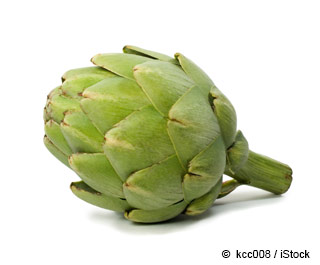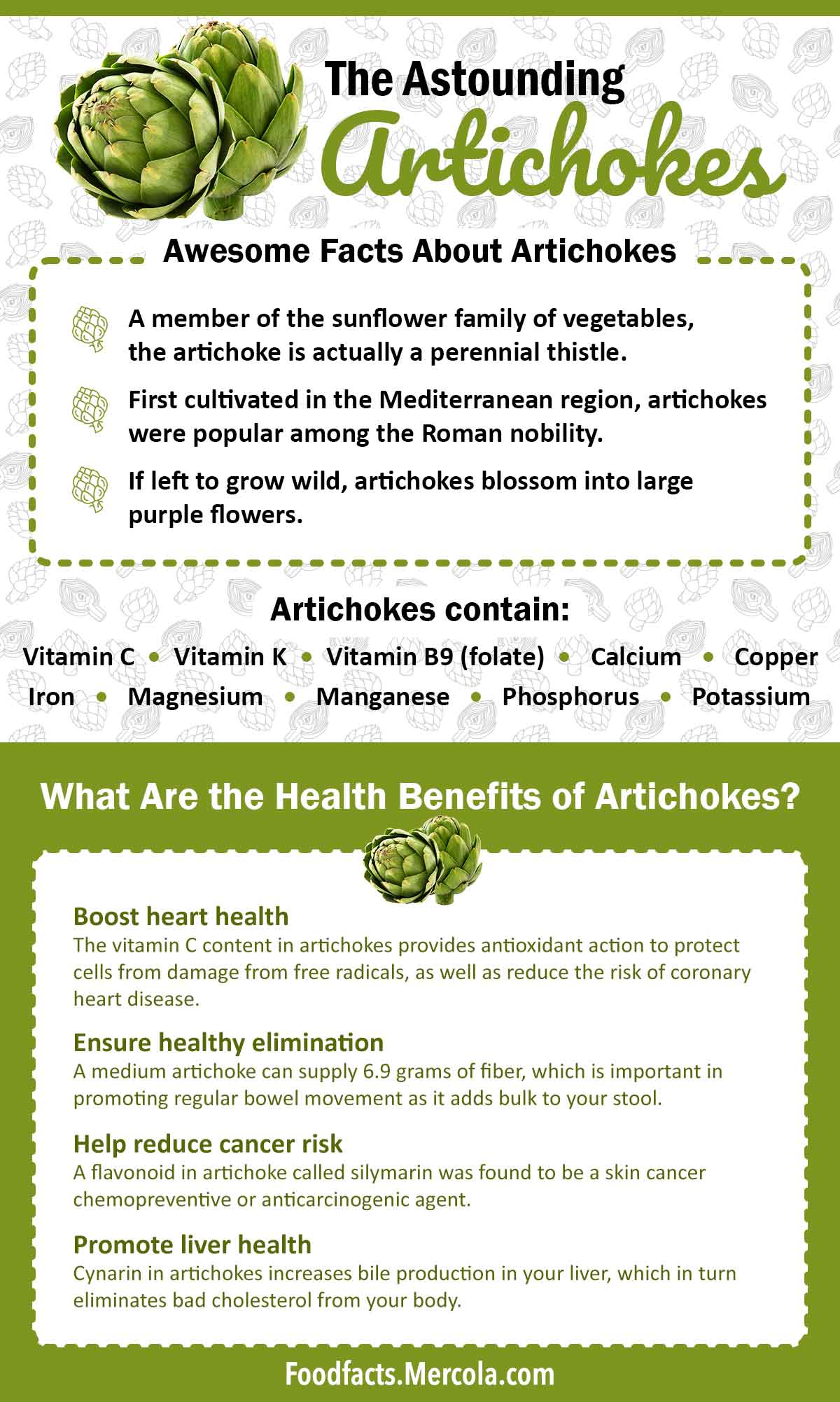Artichoke Attributes
Botanical name: Cynara scolymus

A member of the sunflower family of vegetables, the artichoke is a perennial thistle.1 First cultivated in the Mediterranean region, artichokes were popular among the Roman nobility. They were prepared in honey and vinegar, and then seasoned with cumin to create a treat that can be enjoyed year-round.2
After the fall of the Roman Empire, Arabs cultivated the plant and took it to Spain. Another contributor to its popularity was Catherine de Medici, who took artichokes to France when she arrived from Florence to marry Henry II.3
Today, California provides almost all of the artichokes in the U.S. The California Artichoke Advisory Board notes that it is a minor crop compared to wheat and rice, but still contributes more than $50 million to the economy.4
Health Benefits of Artichoke
A medium artichoke (128 grams) contains about 6.91 grams of fiber,5 which is important for promoting regular bowel movement, as it adds bulk to your stools. Other benefits of fiber include helping ease symptoms associated with common digestive disorders such as diarrhea and constipation.6
Fiber may also help lower your blood sugar7 and blood pressure levels,8 reduce your risk for inflammation,9 protect heart health10 and reduce your bad cholesterol levels.11 Another compound in artichoke that may help reduce the cholesterol in your body is cynarin, which works by increasing the bile production in your liver.12
Artichokes also contain vitamin C,13 also known as ascorbic acid.14 This vitamin may help reduce the risk for coronary heart disease15 and provide antioxidant action to help protect cells against damage from free radicals.16 Vitamin C also regulates the synthesis of collagen, which may help promote quicker wound-healing process,17 and protect the body from disease by helping it absorb iron.18
Other nutrients in artichokes include vitamin K,19 which also has antioxidant properties, and folate, a crucial nutrient for fetal development.20 This vegetable is also abundant in minerals, serving up good amounts of magnesium, manganese, copper, potassium and phosphorus.21,22

How to Grow Artichokes
The great thing about artichokes is that they can grow practically anywhere, but the best locations are places with mild winters and cool summers.23 Furthermore, your garden should have full sun exposure and well-draining soil. Plenty of water is also key to growing high-quality artichokes.24
There are three ways to plant artichokes: through its seeds, roots or shoots. Beginners are generally recommended to employ the root method. Dig the artichokes deep into the soil and place a shovel of compost over them. Space them properly 3 to 5 feet apart since they will be taking up lots of space once they grow. Keep the soil mulched to conserve moisture.25
You may use organic mulch such as grass clippings, straw, aged manure or a mixture of all three to increase harvest quality. Artichokes generally bloom in the early summer, with each stem forming several flower buds.26 If left to grow wild, artichokes blossom into large purple flowers.27
How to Pick Good Artichokes
The ideal time for harvesting artichokes is around late July or early August until the frost arrives. Pick artichokes once they reach full size, just before the bracts begin to open up.28 As an added tip, check if they are at least 3 inches in diameter, which will indicate the opportune harvest moment.29 To store artichokes, place them in an airtight container in the coldest part of your fridge — they should last for up to a week.30
Artichokes Nutrition Facts
To get a better idea of the nutrients you may obtain from eating artichokes, check out the table below:31
Artichoke Nutrition Facts
Serving Size: 3.5 ounces (100 grams), raw
| Calories |
47 |
|
| Total Fat |
0 g |
|
| Saturated Fat |
0 g |
|
| Trans Fat |
|
|
| Cholesterol |
0 mg |
|
| Sodium |
94 mg |
|
| Total Carbohydrates |
10.5 g |
|
| Dietary Fiber |
5.4 g |
|
| Sugar |
0.99 g |
|
| Protein |
3.27 g |
|
| Calcium 44 mg |
Iron |
1.28 mg |
Studies Done on Artichokes
Extracts from edible parts of artichokes were found to have negative effects on breast cancer cells in clinical trials conducted in 2011. Cancer cell movement and invasion were shown to be "remarkably inhibited," indicating the cancer-fighting capabilities of artichokes.32 Other tests showed that not only did artichokes show significant antioxidative potential, but also helped slow liver cancer cell activity.33
A phenolic flavonoid in artichoke called silymarin was found to be a skin cancer chemopreventive or anticarcinogenic agent in a university hospital study in Cleveland.34 Artichoke and green tea both were deemed by the study to be natural agents with the capability to help lower the risk for skin cancer.
Artichoke Healthy Recipes:
Artichoke Soup

|
Ingredients:
|
|
✓ 2 tablespoons coconut oil
|
✓ 1/2 of a large white onion, diced
|
✓ 4 garlic cloves, roughly chopped
|
|
✓ 2 celery stalks, sliced
|
✓ 1 cup cauliflower
|
✓ 12 ounces artichoke hearts
|
|
✓ 3 cups veggie or chicken broth
|
✓ 6 sage leaves
|
✓ Lemon, to taste
|
|
✓ Salt and pepper, to taste
|
✓
|
✓
|
Procedure:
- Sauté the onion in coconut oil, over medium-high heat in a medium pot, stirring for two to three minutes. Add in the garlic and then lower the heat to medium. Cook until fragrant, about two to three more minutes.
- Add in the celery then sauté for one minute. Add cauliflower, artichoke hearts, broth, salt and sage. Bring to a boil, cover, lower heat and simmer until the cauliflowers are very tender, about 15 minutes.
- Blend in two batches for a minute, or until the fibers of the artichokes are well blended.
- Place back in the pot over very low heat. Add a squeeze of lemon and season with salt and pepper, to taste.
(Recipe adapted from Feasting at Home35)
Artichoke Fun Facts
In 1948, California selected its first official Artichoke Queen: Marilyn Monroe. Monterey, California, has been the site of an annual artichoke festival since 1959. One of its popular activities is an Agro Art competition, where entrants create three-dimensional, artful sculptures featuring artichokes and other produce.36
Summary
While artichokes are not as well-known in America as other vegetables, they are every bit as table-worthy, whether steamed, boiled, roasted, stuffed, breaded or added to dips and soups. Nutritionally, they're a good source of vitamins C and K, as well as folate. Studies have also found that they may help lower the risk for cancer.37,38,39